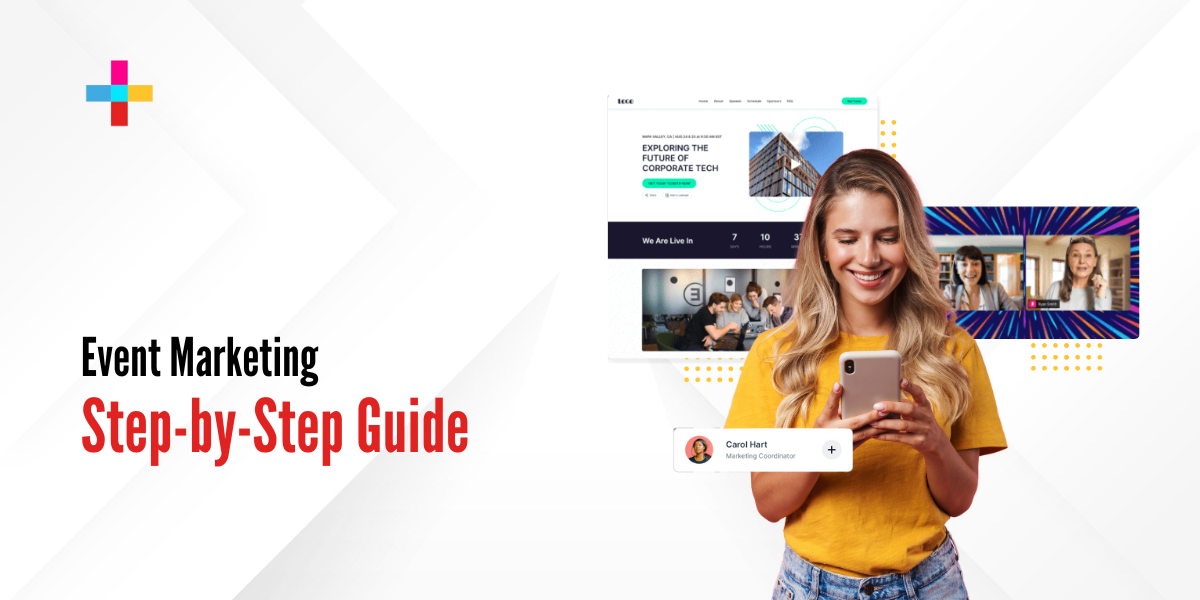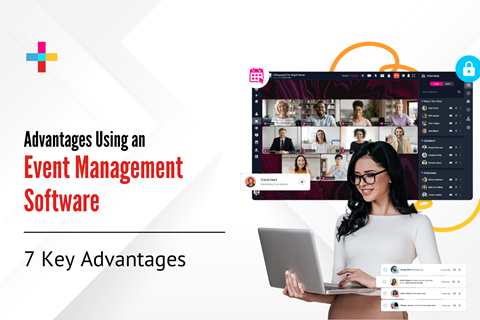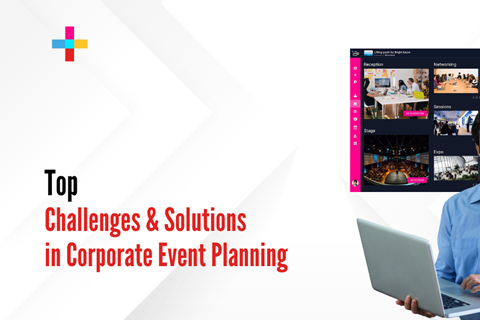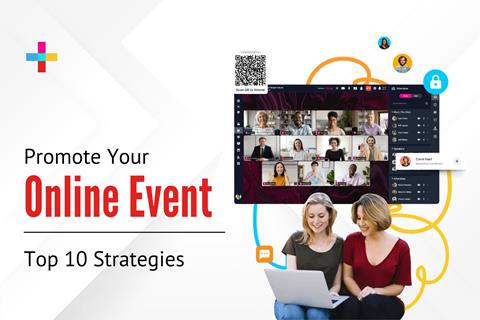Event Marketing: Step-by-Step Guide

Jan 31, 2025 Admin
Crafting an event marketing plan is the cornerstone of a successful event. A clear strategy boosts attendance and ensures your promotional efforts yield tangible results. The global events industry has demonstrated significant growth, with the market size increasing from $1,124.07 billion in 2023 to an anticipated $1,227.30 billion in 2024, reflecting a compound annual growth rate (CAGR) of 9.2%. This upward trend underscores the critical role of events in driving business success.
An effective event marketing plan ensures your message reaches the right audience through the right channels. It helps align your team’s efforts, manage resources efficiently, and create an experience that resonates with attendees. Without one, even the best-planned event risks being overlooked in a competitive marketplace.
In this blog, we’ll guide you through the steps to develop a comprehensive event marketing plan. By following these actionable strategies, you’ll be equipped to promote your event effectively, increase engagement, and deliver memorable results.
What is an Event Marketing Plan?
An event marketing plan is a detailed roadmap that outlines the strategies and actions needed to promote an event effectively. It serves as a guiding document, ensuring every aspect of marketing, from audience outreach to budget allocation, is aligned with your event's goals.
An event marketing plan answers key questions like:
- Who is the target audience?
- What are the objectives of the event?
- Which promotional channels will be used?
- How will success be measured?
By defining these elements, an event marketing plan keeps your efforts organized and also helps you allocate resources efficiently. Whether it's a corporate conference, a product launch, or a virtual workshop, having a plan in place is essential to ensure your event stands out and achieves its purpose.
Why is an Event Marketing Plan Essential?

An event marketing plan is a critical tool that sets the foundation for success. Without a clear plan, marketing efforts can become scattered, leading to wasted time, budget overruns, and missed opportunities to engage your audience.
A well-designed marketing plan ensures every promotional effort is intentionally targeted and contributes to achieving your event’s goals. It helps identify your target audience, select the right marketing channels, and set measurable goals. For instance, knowing whether your priority is driving registrations, increasing brand awareness, or fostering attendee engagement can shape the way you promote the event.
Moreover, having a marketing plan allows you to anticipate challenges and address them proactively. It ensures you’re prepared to optimize resources, adapt to changing circumstances, and track progress effectively. In short, a well-thought-out marketing plan drives attendance and also guarantees a cohesive and impactful promotional strategy.
The 5 P’s of Event Marketing

A well-rounded event marketing strategy revolves around the 5 P’s: Product, Price, Place, Promotion, and People. These elements form the foundation of an effective plan, ensuring that every aspect of your event is designed and marketed to deliver maximum impact.
1. Product
Your event is your product, and its success depends on how well it meets the expectations of your target audience. Start by identifying what sets your event apart—is it the industry-leading speakers, interactive workshops, or exclusive networking opportunities? Highlight the unique value proposition in all your promotional materials.
Additionally, consider how you can tailor the event experience to the preferences of your audience, whether through personalized agendas, hybrid formats, or engaging content delivery.
2. Price
Pricing is a delicate balance between perceived value and accessibility. Develop a pricing strategy that reflects the quality of your event while appealing to a broad audience. Options like tiered pricing, early bird discounts, group packages, or VIP tickets can help cater to various attendee segments.
For example, offering a lower-priced ticket for hybrid events can boost participation from remote audiences while maintaining a premium option for in-person attendees.
3. Place
The "place" of your event can make or break the attendee experience. For in-person events, this involves selecting a venue that is convenient, visually appealing, and equipped with modern amenities. Consider accessibility, parking, and nearby accommodations to enhance the attendee's journey.
For virtual or hybrid events, the place is your digital platform. Choose a solution that offers seamless registration, live streaming, interactive features like Q&A, and networking capabilities to ensure an immersive experience for all participants.
4. Promotion
Promotion is where you bring your event to life in the eyes of your audience. Use a multi-channel approach to maximize reach and engagement. Social media campaigns, email marketing, influencer partnerships, and paid advertising all play a crucial role.
Ensure your messaging is consistent and emphasizes the event’s unique value. Timing is key to starting promotions early and creating a sense of urgency with countdowns, early bird deadlines, and teasers.
5. People
Events are all about building connections, with attendees, speakers, sponsors, and your organizing team playing a pivotal role in their success. Focus on creating meaningful touchpoints for attendees, such as networking sessions, meet-and-greets with speakers, or sponsor-hosted activities.
Equip your team with the tools they need to deliver exceptional support and experiences, ensuring everyone involved feels valued and engaged.
By mastering the 5 P’s of event marketing, you can create an event that meets its goals and also leaves a lasting impression on attendees. These principles provide a framework to streamline planning, improve engagement, and maximize success.
Step-by-Step Guide to Creating an Event Marketing Plan
Creating a well-rounded event marketing plan involves breaking down the process into manageable steps. Here’s how you can develop a strategy that ensures your event gains the attention it deserves.
Step 1: Define Your Event Goals and Objectives

Every successful event starts with a clear purpose. Ask yourself: What do you want to achieve with this event? Whether it’s generating leads, increasing brand awareness, launching a new product, or fostering community connections, having specific goals will guide every aspect of your marketing plan.
Set SMART Goals
Your goals should be Specific, Measurable, Achievable, Relevant, and Time-bound (SMART). For instance, instead of saying “increase registrations,” aim for “achieving 500 paid registrations within three months.”
Break Down Objectives
If your primary goal is increasing registrations, break it into smaller objectives, such as building email subscribers, driving website traffic, and converting leads through promotions. These focused objectives will make it easier to track progress and allocate resources effectively.
A strong foundation of goals and objectives ensures that all marketing efforts are targeted and meaningful, helping you measure success and refine your approach over time.
Step 2: Allocate Your Budget Strategically

An effective event marketing strategy requires a well-planned budget to ensure resources are utilized efficiently. Establishing a realistic budget helps you prioritize activities that deliver maximum impact while staying within financial constraints.
Break Down Expenses
Divide your budget into key categories, such as:
- Advertising: Paid campaigns, social media ads, or influencer collaborations.
- Content Creation: Graphic design, video production, and promotional materials.
- Event Tech: Event management software, virtual platforms, analytics tools, and more
- On-Site Requirements: Venue rental, catering, or logistics for in-person events.
Prioritize High-Impact Activities
Focus on strategies that yield the best ROI. For instance, invest in targeted ads or tools like Eventcombo’s Registration Management system to simplify attendee sign-ups and engagement tracking.
Include a Contingency Fund
Set aside a portion of your budget, around 5–10%, to cover unexpected expenses, such as last-minute adjustments or additional marketing needs.
With a clear budget in place, you can make informed decisions about how to allocate resources, ensuring every dollar contributes to the success of your event.
Step 3: Understand Your Audience

Your audience is at the heart of your event marketing strategy. Without a clear understanding of who your attendees are, it’s nearly impossible to craft messages and campaigns that resonate with them.
Identify Key Demographics
Start by outlining the basics—age, profession, location, and industry. Are you targeting young professionals eager to network, or are you reaching out to seasoned industry leaders seeking advanced insights? These details help define the tone and content of your messaging.
Go Beyond the Basics
Learn more about the preferences and behaviors of your target audience. What are their pain points? What motivates them to attend events? For example, some attendees may prioritize learning from expert speakers, while others are drawn to networking opportunities.
Create Audience Personas
Develop audience personas that represent the different segments of your target group. For instance:
- Persona A: A mid-level marketing professional looking to upskill.
- Persona B: A small business owner seeking to build connections and discover new tools.
Use Data to Validate Insights
Review data from past events, surveys, or website analytics to confirm assumptions about your audience. If your previous attendees were highly active on LinkedIn, prioritize that platform for promotions.
Understanding your audience ensures that your marketing strategy is tailored, impactful, and focused on delivering value to the right people.
Step 4: Develop a Unique Event Message
A compelling event message is very necessary for your marketing efforts. It communicates the value of your event and convinces your audience why they should attend. Your message should clearly articulate what sets your event apart and how it benefits attendees.
Define Your Value Proposition
Ask yourself: What makes this event special? Is it the lineup of keynote speakers, the innovative topics, the exclusive networking opportunities, or something else? Highlight these aspects to create a strong and unique value proposition (UVP). For example:
- Learn cutting-edge digital marketing strategies from industry leaders.
- Gain exclusive insights into the future of AI in business.
Focus on Attendee Benefits
Rather than focusing solely on what the event offers, emphasize how attendees will benefit. Will they gain actionable skills, make valuable connections, or access exclusive resources? For example: “Boost your career with skills that today’s employers demand.”
Keep It Consistent Across Channels
Ensure your event message is consistent across all platforms, including your website, social media, and email campaigns. This builds trust and reinforces your event’s purpose in the minds of potential attendees.
Incorporate Keywords
Integrate relevant keywords naturally into your messaging. For instance, if the event is about marketing, phrases like “how to create a marketing plan for an event” or “event promotion strategies” should appear in your copy.
A clear and compelling message makes your event stand out in a crowded marketplace and ensures your audience understands its value immediately.
Step 5: Create a Promotional Timeline

An effective promotional timeline ensures your marketing efforts are well-coordinated and reach the right audience at the right time. Dividing your activities into distinct phases pre-event, during-event, and post-event helps maintain momentum and ensures maximum engagement at every stage of the event lifecycle.
Pre-Event Phase
The pre-event phase is all about creating awareness and driving early registrations.
- Start Early: Begin promotions 2 months prior to a virtual event and 3-4 months before an in-person or hybrid event, depending on its size and scope.
- Use Teasers: Share sneak peeks of speakers, topics, or special features to spark curiosity.
- Offer Early Bird Discounts: Encourage registrations by providing incentives for early sign-ups.
- Utilize Digital Channels: Use social media and email campaigns to build excitement by sharing countdown posts, key announcements, and engaging updates.
During-Event Phase
Keep attendees engaged while also appealing to those who haven’t yet joined.
- Use Live Updates: Post highlights, speaker quotes, or session clips on social media in real-time.
- Encourage Interaction: Run live polls, Q&A sessions, and hashtags to foster audience participation.
- Capture Attention with Visuals: Share behind-the-scenes content or attendee testimonials to create a sense of community.
Post-Event Phase
The event might be over, but your marketing shouldn’t stop.
- Re-purpose Event Content: Post-event photos, videos, and key takeaways to keep the conversation going.
- Gather Feedback: Distribute surveys to understand what worked well and identify areas for improvement.
- Promote Future Events: Build momentum by teasing your next event and offering loyalty discounts to past attendees.
A well-thought-out promotional timeline keeps your efforts organized and ensures consistent engagement with your audience at every stage.
Step 6: Choose the Right Event Marketing Channels

Selecting the most effective marketing channels is crucial for reaching your audience and achieving your event goals. The right combination of platforms ensures your message is delivered where your target attendees are most active and engaged.
Email Marketing
Email remains one of the most effective tools for event promotion.
- Segment Your Audience: Divide your email list based on factors like demographics or interests to deliver targeted messages.
- Send Timely Updates: Share event details, reminders, and exclusive offers to keep recipients engaged and informed.
Paid Advertising
Invest in paid campaigns to expand your reach to a broader audience.
- Use Targeted Ads: Focus on running campaigns on platforms like Google Ads and Facebook Ads to connect with specific demographics or interests. This approach ensures your event reaches the right audience effectively.
- Promote Key Features: Highlight elements that set your event apart, such as exclusive speakers or hands-on workshops.
Partnerships and Collaborations
Collaborate with industry influencers, sponsors, or other organizations to tap into their networks.
- Cross-Promote: Share each other’s content to expand reach organically.
- Host Pre-Event Sessions: Partner with experts for webinars or live chats that build excitement for the main event.
By choosing a strategic mix of marketing channels, you can maximize visibility, engage your audience effectively, and create a buzz around your event.
Step 7: Monitor and Optimize Your Campaign

Once your event marketing plan is in motion, tracking its performance and making adjustments is crucial for ensuring success. Regular monitoring allows you to identify what’s working, address challenges, and refine your strategies in real-time.
Track Key Metrics
Identify the most relevant metrics based on your event goals. For example:
- Website Traffic: Monitor the number of visitors to your event page and their behaviors, such as time spent on the page or registrations completed.
- Registration Numbers: Keep an eye on the volume and pace of sign-ups to gauge interest and the effectiveness of your outreach.
- Engagement Rates: Assess how your audience interacts with your campaigns on email, social media, and ads.
Use Analytics Tools
Use tools like Google Analytics, email marketing platforms, and social media dashboards to gather detailed insights. Eventcombo’s platform also offers robust reporting features, allowing you to analyze attendance trends, traffic sources, and other key performance indicators.
A/B Test Your Strategies
Experiment with different elements of your campaigns to see what resonates best with your audience. Test variations of:
- Subject lines or visuals in email campaigns.
- Headlines and CTAs in ads.
- Content formats, such as videos versus static images on social media.
Based on your findings, tweak your approach to improve outcomes. For instance, if a particular platform generates more traffic than others, shift more resources toward it.
Gather Feedback Post-Event
Once the event concludes, gather attendee feedback to understand what worked and what didn’t. Surveys, polls, and follow-up emails can provide valuable insights to refine plans.
Monitoring and optimizing your campaigns ensures that your event marketing stays effective, adaptable, and results-driven from start to finish.
Choose Eventcombo to Enhance Your Marketing Plan

When it comes to event marketing, having the right technology partner can make all the difference. Eventcombo’s all-in-one platform is designed to simplify the planning and promotion process, helping you create events that captivate and engage your audience.
Key Features for Event Marketing Success:
- Comprehensive Event Dashboard: Manage every aspect of your event from a single platform, from registration to attendee engagement.
- Fireworks Virtual Platform: Create immersive hybrid and virtual events with interactive features like live polling, Q&A, and networking tools.
- Event Microsites and Custom Landing Pages: Design visually appealing, fully customizable event microsites to showcase your event details and drive registrations.
- Email Marketing Engine: Drive targeted campaigns with personalized outreach to promote your event effectively and maximize attendance.
- Multi-Channel Marketing Integration: Seamlessly connect with email, social media, and advertising platforms for cohesive campaigns that reach your audience where they are.
- Dynamic Event Promotion Tools: Leverage discount codes, early bird promotions, and referral programs to incentivize registrations and boost ticket sales.
- Community Membership Management: Build lasting connections with your audience through the community feature that offers tailored experiences, content, and insights.
- Lead Capture and CRM Integration: Integrate with tools like Salesforce, HubSpot, and others to streamline lead management and nurture attendee relationships.
- Analytics and Reporting: Monitor your event's performance in real-time, analyze engagement metrics, and make data-driven decisions to optimize your marketing efforts.
Eventcombo is your ultimate partner in creating impactful marketing plans that drive engagement and results. Book a demo today and discover how our all-in-one platform can take your event marketing strategy to the next level!
close

















